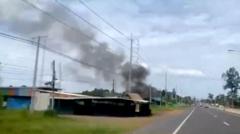The dispute between Thailand and Cambodia, which traces back over a century, intensified this week as fighting erupted along their shared border. According to Thai sources, the recent violence, which began on Thursday, resulted in at least 12 civilian deaths, while details regarding casualties on the Cambodian side remain unclear.
The conflict reportedly started with gunfire exchanged across the border, leading to accusations from Thailand that Cambodia employed rocket attacks, prompting air strikes on Cambodian military positions.
The core of the tensions lies in a historical disagreement dating back to the demarcation of borders established after French colonial rule in Cambodia. Hostility significantly escalated in 2008 when Cambodia attempted to register an ancient temple located in a disputed area as a UNESCO World Heritage site, drawing protests from Thailand. Sporadic conflicts in subsequent years have turned increasingly violent, culminating in a significant escalation following the death of a Cambodian soldier in May.
In recent months, both countries have enacted border restrictions: Cambodia has halted imports of Thai fruits and vegetables and restricted energy and internet imports. Additionally, troop deployments have increased on both sides of the border as tensions simmered.
On Thursday, conflicting narratives emerged regarding the initiation of the hostilities. Thai officials claim that Cambodian military drones were deployed for surveillance and that Cambodian forces began shooting first, prompting a defensive response. In contrast, Cambodian authorities assert that Thai troops breached agreements at a sacred temple site, leading to heightened tensions and a preemptive response from their side.
Leaders of both nations have emphasized the importance of resolving the conflict peacefully, with Thailand's acting Prime Minister urging caution and compliance with international laws. Meanwhile, Cambodian Prime Minister Hun Manet declared a commitment to defend against aggression while seeking a resolution.
Despite the current localized conflict, travel advisories remain general, with officials urging caution in specific border regions popular with tourists. The ongoing situation has garnered international attention, particularly as citizens and travelers are advised to remain vigilant amid the fluid landscape of border diplomacy.
As the situation develops, the global community watches closely, aware of the potential for further escalation absent strong diplomatic interventions from either side.
The conflict reportedly started with gunfire exchanged across the border, leading to accusations from Thailand that Cambodia employed rocket attacks, prompting air strikes on Cambodian military positions.
The core of the tensions lies in a historical disagreement dating back to the demarcation of borders established after French colonial rule in Cambodia. Hostility significantly escalated in 2008 when Cambodia attempted to register an ancient temple located in a disputed area as a UNESCO World Heritage site, drawing protests from Thailand. Sporadic conflicts in subsequent years have turned increasingly violent, culminating in a significant escalation following the death of a Cambodian soldier in May.
In recent months, both countries have enacted border restrictions: Cambodia has halted imports of Thai fruits and vegetables and restricted energy and internet imports. Additionally, troop deployments have increased on both sides of the border as tensions simmered.
On Thursday, conflicting narratives emerged regarding the initiation of the hostilities. Thai officials claim that Cambodian military drones were deployed for surveillance and that Cambodian forces began shooting first, prompting a defensive response. In contrast, Cambodian authorities assert that Thai troops breached agreements at a sacred temple site, leading to heightened tensions and a preemptive response from their side.
Leaders of both nations have emphasized the importance of resolving the conflict peacefully, with Thailand's acting Prime Minister urging caution and compliance with international laws. Meanwhile, Cambodian Prime Minister Hun Manet declared a commitment to defend against aggression while seeking a resolution.
Despite the current localized conflict, travel advisories remain general, with officials urging caution in specific border regions popular with tourists. The ongoing situation has garnered international attention, particularly as citizens and travelers are advised to remain vigilant amid the fluid landscape of border diplomacy.
As the situation develops, the global community watches closely, aware of the potential for further escalation absent strong diplomatic interventions from either side.


















